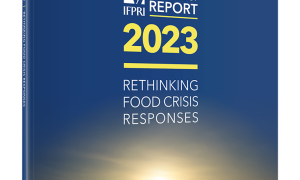Food systems must go through a fundamental transformation if they are to become environmentally sustainable, generate nutritional benefits and improve economic equity.
Search
Facts, interests, and values: Identifying points of convergence and divergence for food systems
Better policies offer significant potential to meet the challenges facing food systems, but policy reform has often proved difficult.
In August 2022, the Razoni cargo ship, laden with 26,000 tons of grain, navigated a narrow corridor of mined waters outside Ukraine’s port of Odessa.
Policy coalitions in food systems transformation
Coalitions—or a set of individuals and groups with shared policy preferences—lie at the heart of political economy.¹ They are also often considered central to policy change.
This chapter examines four important food production innovations that have been favored by scientists but opposed by influential swathes of the public: Green Revolution farming, industrial agriculture, the use of synthetic chemicals versus organic
The current structure of the global food system is increasingly recognized as unsustainable.
The book emphasizes that the viability of reforms requires joint consideration of both the complexity of local, national, and global food systems and the increasingly polarized political and institutional contexts in which food policy decision-making occurs
Transformation of food systems: How can it be financed?
The paper provides a review of the work on financing the transformation of food systems done by the author and colleagues at IFPRI.
Role of socio-economic research in developing, delivering and scaling new crop varieties: the case of staple crop biofortification
The CGIAR biofortification program, HarvestPlus, was founded with the aim of improving the quality of diets through micronutrient-dense varieties of staple food crops.
Impact of global value chains on tariffs and non-tariff measures in agriculture and food
We analyse whether global value chains (GVCs) reduce trade barriers in the agricultural and food sectors as they affect lobbying and government incentives.
2022 annual report
IFPRI’s 2022 Annual Report presents highlights from our research work in low- and middle-income countries and on global challenges.
لقد واجه العالم الكثير من الازمات خلال عام 2022.
The United Nations Food Systems Summit, aimed to move food systems transformation to the top of the global policy agenda.
En 2022, el mundo se enfrentó a múltiples crisis.
In February 2022, news of Russia’s invasion of Ukraine dominated headlines around the world.
En 2022, le monde a subi des crises multiples.
2022年,世界面临多重危机。旷日持久的2019冠状病毒病疫情(COVID-19)、重大自然灾害、内乱和政治动荡以及气候变化日益严重的影响对食物系统的破坏仍在继续,而与此同时,俄乌战争和通货膨胀加剧了全球粮食和化肥危机。危机数量不断增加,多种危机的叠加影响日益加剧,饥饿人口和流离失所者数量不断攀升,促使人们呼吁重新思考粮食危机应对措施,从而为变革创造了一个真正的机会。
In 2022, the world faced multiple crises.
In 2022, the world faced multiple crises.
Now is the time to rethink how we address food crises. Better prediction, preparation, and resilience building can make future crises less common and less devastating, and improved responses can contribute to greater food security, better nutrition, and sustainable livelihoods

